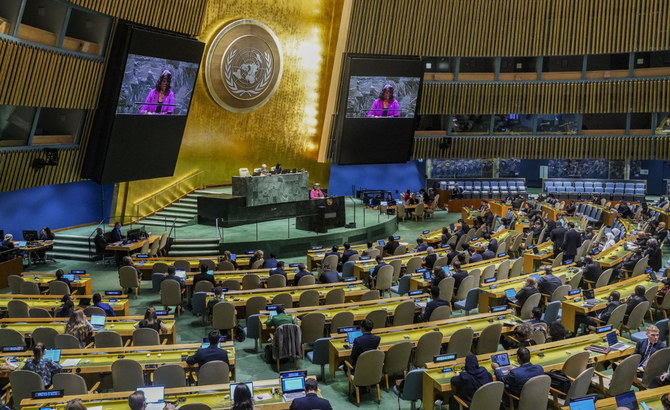UN should celebrate its successes but be sure to reform

https://arab.news/ndvf8
The UN this week marked another anniversary, having officially come into existence 78 years ago on Oct. 24, 1945. It replaced the League of Nations, which had been formed after the First World War but had failed to prevent the Second World War.
Let us examine the evolution of this critical international organization, its failures, accomplishments and challenges, as well as its methods and the reforms that can be carried out in order to increase its effectiveness when it comes to dealing with today’s complex issues.
At the end of the most destructive war in history, the Second World War, in which as many as 60 million people are believed to have died, the UN was founded. Its initial objectives were to prevent future wars, play the role of peacemaker on the global stage, promote international security and stability, resolve conflicts between sovereign states and develop friendly relationships between nations.
The UN Charter, which was adopted unanimously at the San Francisco War Memorial Opera House in June 1945, created the Security Council, which originally consisted of five permanent and six nonpermanent members. It has since expanded to 10 nonpermanent members. Only the five permanent members have the right to veto draft resolutions.
The predominant organizational structure of the UN remains the same to this day. The UN currently has five active principal operational organizations: the UN Secretariat, the General Assembly, the Security Council, the Economic and Social Council and the International Court of Justice. The number of member states has gradually increased, particularly following the decolonization period of the 1950s and 1960s, growing from the original 51 to today’s 193, all of which are part of the UNGA.
The UNGA is the main body of the UN — it deals with policymaking, votes on UN decisions and is a critical platform that can rally multilateral cooperation and support in order to discuss and agree on collective measures relating to resolving major issues. Resolutions that are passed by the UNGA are considered non binding, whereas those passed by the UNSC are binding and are enforced by the UN.
It is important to point out that resolutions passed by the UNGA tend to be more effective in terms of their enforcement and implementation than those passed by the UNSC, in spite of the fact that they are not officially binding. This is due to the fact that UNGA resolutions have more political influence and are more inclusive because they are endorsed by a majority of the UN’s member states, rather than just a few countries. But it is important to point out that, unfortunately, one member of the UN Security Council can also prevent the UNSC from passing a resolution or calling for a ceasefire.
As the number of member states expanded and activism around the world increased, the UN’s mission and responsibilities grew from simply maintaining international peace and security to tackling issues regarding social and economic development, the environment and fundamental human rights. As a result, the number of resolutions passed by the UNSC has increased considerably and more agencies have been created within the organization. These include UNESCO, UNICEF, the World Health Organization and the World Food Programme.
As the number of member states expanded and activism increased, the UN’s mission and responsibilities grew
Dr. Majid Rafizadeh
However, the UN has frequently been criticized for some of its flaws, such as the ability of only one member of the UN Security Council to veto a resolution, its lack of enforcement power, inefficient global governance amid modern-day challenges, inability to reach a consensus or act in the face of some of the world’s gravest conflicts — including the wars in Syria and Sudan — slow processes, perceived bias, and lack of modernization.
One of the biggest current criticisms of the UN is its inability to implement an immediate ceasefire in the relentless bombardment of Gaza by Israel. This is supported by a majority of Security Council members, but the US (Israel’s staunchest ally) has blocked it. Nearly 100 UN members have also called for a ceasefire, but the organization is paralyzed to take action.
It is fundamentally undemocratic when one member can prevent the UN Security Council from imposing a ceasefire to allow the entry of humanitarian aid. Even Secretary-General António Guterres has expressed his frustration at the UN’s inability to act.
Reforms that could increase the effectiveness of the UN include expanding the number of member states in the Security Council, simplifying the decision-making process by enhancing its management, and increasing its engagement with civil societies, businesses, philanthropists and the private sector. As former Secretary-General Ban Ki-moon has said: “Broad partnerships are the key to solving broad challenges. When governments, the UN, businesses, philanthropies and civil society work hand in hand, we can achieve great things.”
Other potential reforms include improving the UN’s transparency and accountability, adopting more efficient and coordinated counterterrorism strategies, employing better management of the UN’s budget and its allocation, improving its peace-building capabilities, and taking more proactive measures to prevent wars from breaking out in the first place.
Such constructive reforms would enhance the UN’s effectiveness at tackling complex global issues. As Dag Hammarskjold, the second Secretary-General, pointed out in 1955: “The UN is not just a product of do-gooders. It is harshly real. The day will come when men will see the UN and what it means clearly. Everything will be all right — you know when? When people, just people, stop thinking of the UN as a weird Picasso abstraction, and see it as a drawing they made themselves.”
• Dr. Majid Rafizadeh is a Harvard-educated Iranian-American political scientist. X: @Dr_Rafizadeh









































